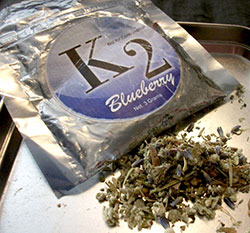By Josie Grove

The Somerville Board of Aldermen is considering implementing a citywide ban on cannabinoids, as has been done recently in Boston.
Nationally, synthetic cannabinoids are second only to marijuana in use by high school seniors. Alderman-at-large Dennis Sullivan is concerned about the substances in Somerville. “Kids are using it. It’s having a negative effect,” said the alderman. He is particularly concerned about the synthetic drugs being marketed to children. “Lego, White Tiger, it looks like a cartoon, Scooby Doo.”
That’s why, at a meeting of the Board of Aldermen in late 2015, Sullivan proposed to ban the substance in Somerville. Last Tuesday night, the board’s Legislative Matters discussed initial steps to enact such a ban.
Sometimes called “spice” and “K2,” synthetic cannabinoids are not marijuana, but are dried plants that have been sprayed with a chemical that imitates the active ingredient in marijuana, tetrahydrocannabinol (THC). “These substances really have nothing to do with cannabis,” said Bill Downing, a member of Massachusetts Cannabis Reform Coalition’s board of directors. “We have almost zero experience with synthetic cannabinoids, their effects are almost completely uninvestigated, and some of them seem to be very, very dangerous substances,” he said.
Despite a federal ban, synthetic cannabinoids are available in Somerville for two primary reasons. First, synthetic cannabinoids are difficult to regulate because manufacturers change the chemical formula to keep ahead of regulations. Second, the federal ban must be enforced by federal agents.
The city of Boston banned synthetic cannabinoids in August 2015, punishable by a $300 fine. Alderman Sullivan wants to follow suit. The Somerville Board of Aldermen does not have the power to make selling synthetic cannabinoids a criminal offense: like Boston, the most they could do would be to levy a $300 fine.
Sullivan wants to make sure that enforcing the ban would be an effective way of preventing use of the drugs. “The next step is to have Somerville Cares About Prevention, the department that handles drug use and drug abuse in the city, and also the health department, to take a look at the issue of synthetic marijuana and give a report back,” said Sullivan.
I want to get a perspective from SCAP whether it’s an effective way to combat this,” said Sullivan. “I just want to get their take on it, and make sure we’re not wasting resources that could be applied in other areas.”
Sullivan also want to gather more comprehensive data about the drugs’ use in Somerville from surveys already administered to high school students. “I’m just one set of eyes,” he said. “I’ve gotten a couple of calls as an alderman, as a professional law enforcement officer I’ve seen people under the influence of it.”
The other consideration for Sullivan is the resources required to enforce the ban. “We have an opiate problem, it’s a big problem, people are dying. I want to make sure our limited resources, our precious resources, are applied in the best way.
“Is it worth doing?” he asks. “That’s what I want to know.”
Downing does not think a ban addresses the root cause of the problem. “The most important point here is that no one would bother taking, or even making, synthetic cannabinoids if cannabis were more regulated and available and available as a legal product,” he says. “The only reason people are using synthetics is that it’s illegal and it’s expensive for people to get cannabis because of the prohibition. It’s forcing a public health crisis.”
Downing’s solution? “I would guess that by offering legalized cannabis that you’re going to be seeing a lot less of this synthetic stuff out there.”
For now, Sullivan just wants to get the synthetics out of Somerville. “I don’t see any benefit of it at all. I don’t see any benefit of having it for sale in the city.”













Reader Comments